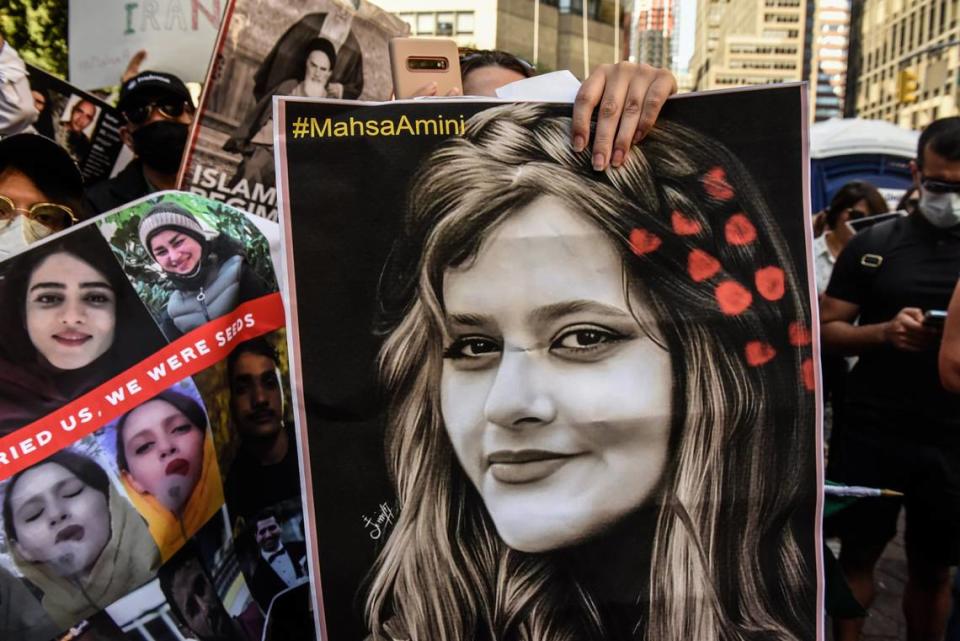American women don’t have it so bad. Real oppression is what happened to woman in Iran
It’s easy to take things for granted in America, especially those that are so fundamental they’re invisible.
Take freedom. It’s a sweeping word and it means something different to everyone. The freedom to work 80 hours a week? To worship God or no god? In America, we enjoy First Amendment freedoms that are virtually unprecedented elsewhere, and with them, a bunch of trickle-down freedoms that make life sweeter.
This isn’t the case everywhere in the world, and Iran is Exhibit A. Iran is still held captive by Sharia law — rooted in the ancient Islamic legal system — which is demanding and particularly oppressive to women, who have few independent rights of their own.
On Sept. 16, a 22 year-old woman, Mahsa Amini, was arrested and then allegedly beaten to death by the “morality police,” because her hijab — her cloth head covering —was showing part of her hair or being worn “inappropriately.” Worse, Iranian authorities tried to cover up the incident and told Amini’s family she had died from a heart attack.

There seems to be little doubt among the Iranian people about what really happened. Amini’s cruel death over her attire has sparked outrage and riots. Iranian women, long oppressed by their own government, are bravely removing their hijabs in protest, burning them, and cutting their long hair — an act of defiance.
At one riot, the crowd shouts, “Death to the dictator.” In response to the protests, the Iranian government has restricted access to WhatsApp and Instagram. Protests have spread, too, including one in Dallas over the weekend.
The Iranian government’s response is the very definition of tyranny. This is what it really looks like to be oppressed. This is true courage in the face of an authoritarian government. In America, while things are not perfect, some people are racists or anti-religious bigots and political polarization is high, we are a far cry from this kind of environment. Including for women.
In America, women enjoy the same freedoms men do. Men still have advantages, but the American government does not systematically oppress women for something as small as what they’re wearing. Women can work, stay home, have kids or not.
If women work the same job as men, with the same qualifications, for the same amount of time, there’s very little wage gap. In America, a woman can be a Supreme Court justice, even with seven kids, or become vice president. I have no doubt, in my lifetime, I’ll see a woman become president of the United States.
Yet American women complain about the so-called gender wage gap. Some are outraged that they can’t have an abortion on demand. They complain there are no good men left to date or that men are such awful creatures, we don’t even need them anymore.
Women in America have so many choices they’ve become fodder for debates: Women who complain their kids are exhausting or about being a stay-at-home mom, will chide other women for choosing not to have kids. In reality, both choices or the freedom of any choice, is a gift.
Sometimes, complaints drive change. Women in America have often been responsible for ridding our laws of true, systemic inequality. And of course, just because women in other countries suffer 10 times more doesn’t mean women in America should bask in our freedoms and sit around eating bonbons.
But the situation in Iran, the tragic death of a 22 year-old woman with her life ahead of her, calls for much-needed perspective. Maybe things aren’t so bad in America. Maybe the blessings of liberty are truly unfathomable to some people. Maybe a woman in Iran would give her hijab to experience an hour of our worst day in America.
There’s a time and a place to fight for more change at home, but right now, we should be applauding the women of Iran, helping them exact justice for Mahsa Amini, and hoping that maybe this will be the time things finally change for them.

 Yahoo Movies
Yahoo Movies 
